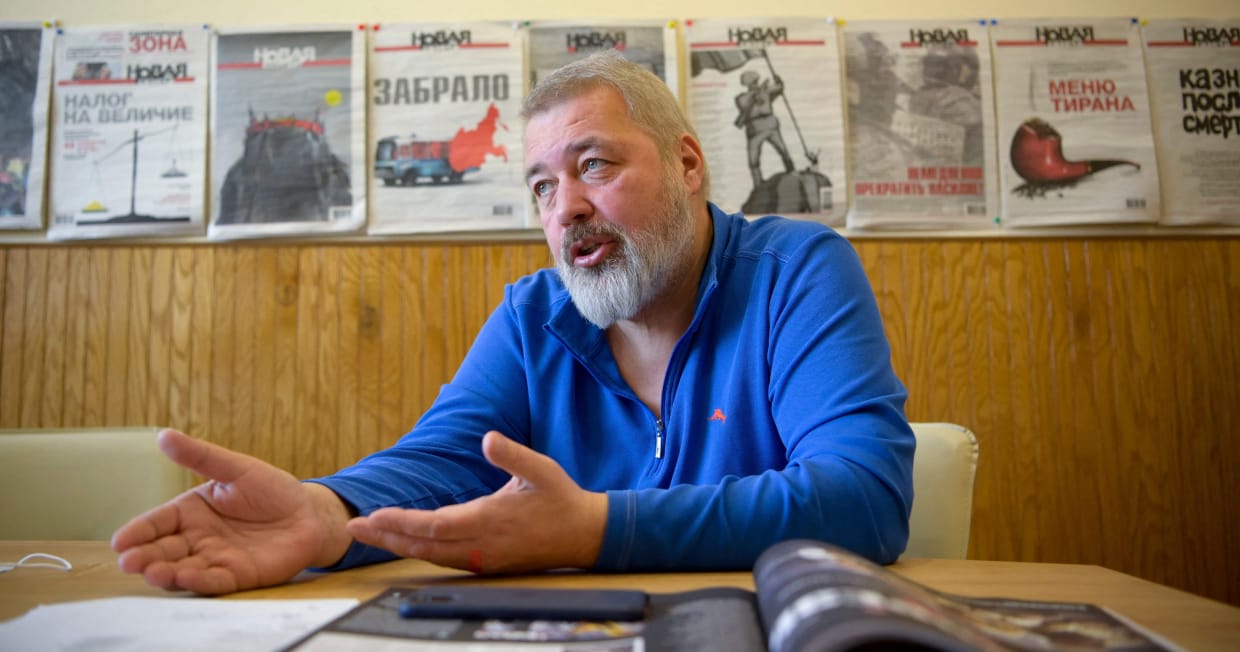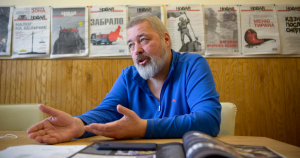
Nobel Peace Prize for Russian journalist sparks controversy

Dmitry Muratov, editor-in-chief of independent Novaya Gazeta newspaper, became the first Russian journalist to receive the Nobel Peace Prize on Friday. Those who wanted to see the prize go to jailed opposition leader Alexei Navalny were deeply unhappy with the decision.
- Novaya Gazeta started out as one of Russia’s first independent media outlets, and today it is one of the few left. Later this month, Muratov will celebrate his 60th birthday: 24 of those years have been spent at the helm of Novaya Gazeta. The newspaper was established in 1993 by staff who left the Soviet-era title Komsomolskaya Pravda. “The ones who stayed wanted to make KP into a tabloid, but we did not want to produce a tabloid,” Muratov explained later.
- Initially, all shares in the newspaper were held collectively. Their first computers were purchased with money from the Nobel Peace Prize fund of Mikhail Gorbachev, the last leader of the Soviet Union, who was friends with Muratov. Gorbachev became a shareholder in 2006 at the same time as banker Alexander Lebedev who was then a parliamentary deputy. The two men bought 49 percent of the newspaper (Lebedev had 39 percent, and Gorbachev 10 percent). When Lebedev began having financial problems in 2014, Novaya Gazeta found a new sponsor – Sergei Adonyev, the former co-owner of Russian telecoms operator Yota. Adonyev has close ties to Sergei Chemezov, the influential head of state defense corporation Rostec who is also close to Putin. Today, according to Muratov, 76 percent is owned by staff, Lebedev holds 14 percent and Gorbachev 10 percent. Since 2018, the newspaper has also been financed by crowdfunding.
- Muratov dedicated his Nobel Prize to the six Novaya Gazeta journalists killed while working for the newspaper. “The Nobel Peace Prize cannot be awarded posthumously, it is awarded to living people. Apparently, they decided to give it to me as I am still alive, while having in mind Yury Shchekochikhin, Igor Domnikov, Anna Politkovskaya, Nastya Baburova and Stas Markelov, Natasha Estemirova,” he said in an interview with independent media outlet Meduza (designated a ‘foreign agent’ by the Russian government). The day before Muratov’s win was announced, the 15-year statute of limitations expired in Politkovskaya’s murder.
- Muratov’s award was criticized by supporters of Navalny, who had been one of the favorites to win the prize. Muratov later said that if he had been on the Nobel committee, he would have given the prize to Navalny. One of Navalny’s colleagues, Lyubov Sobol, congratulated Muratov but added that she still regarded Navalny as the “leading agent for peace in our country and beyond”. Leonid Volkov, the head of Navalny’s HQ (designated a ‘foreign agent’ and extremist organization by the Russian government) tweeted Muratov’s own quote from a recent dispute between the two men: “As a champion of human freedom, I certainly support your right to puke.” That’s how Muratov signed off a recent open letter to Volkov in which he defended the much-criticised online voting system used in Moscow as part of parliamentary elections last month.
- Konstantin Sonin, a professor at Chicago University and Moscow’s Higher School of Economics, called the decision “not just stupid, but corrupt.” But he later changed his mind. “My yesterday reaction re: Nobel peace prize was wrong. Whatever my issues with the committee, Dmitry Muratov has been brave and smart,” he wrote on Twitter.
- Political analyst Fyodor Krasheninnikov wrote on Facebook that the Nobel Committee’s decision suggests “freedom reigns in Russia” and “rumors of the suppression of the independent media and critics of the government are greatly exaggerated”. He added: “Most importantly, nobody from Russia will win any Nobel Prize in the foreseeable future. A big win for the Kremlin, I must say.”
- There was also criticism of Muratov’s decision to donate part of the prize money (he and Philippine journalist Maria Ressa should each get about $570,000) to charity Circle of Kindness, which helps children with rare illnesses and was set up by President Vladimir Putin in January. Some commentators recalled how Navalny donated his €10,000 ($11,570) prize money when he won the Boris Nemtsov Prize for Courage to the families of four jailed activists.
- Notably, Muratov was congratulated by top Russian officials (something impossible to imagine if Navalny had been the winner). Putin’s press secretary Dmitry Peskov said Muratov “consistently works according to his ideals, he is committed to his ideals. He is talented, he is bold. Of course, this is a big achievement.” And the press secretary for Russian Prime Minister MIkhail Mishustin said the prize rewarded Muratov’s “talent, great professionalism, loyalty to his beliefs and, most of all, human qualities.”
- The reaction among Russ’s pro-Kremlin journalists was mixed. The head of state-owned RT Margarita Simonyan congratulated Muratov, saying that she was happy to think the prize money would help sick children. However, television presenter Dmitry Kiselev said that “decisions like this devalue the prize itself”.
Why the world should care: Pro-Kremlin activist Alexander Ionov recently called for Novaya Gazeta to be designated a ‘foreign agent’, a Soviet-era label akin to ‘spy’ that entails significant financial and bureaucratic burdens. Some believe Muratov’s Nobel Prize may protect Novaya Gazeta from this fate, however, history suggests the opposite: Soviet physicist and human rights activist Andrei Sakharov was persecuted despite his Nobel laureate status.



